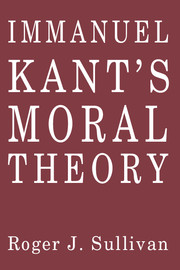Book contents
- Frontmatter
- Contents
- Preface
- Key to abbreviations and translators
- 1 Introduction
- 2 The context for Kant's moral philosophy
- Part I The nature of morality
- 3 The nature of human action
- 4 Prudence: taking care of our own interests
- 5 Morality: living autonomously
- 6 Morally obligatory ends
- 7 The defense of morality
- 8 The primacy of morality
- Part II The moral norm for persons
- Part III The norm for moral judgment
- Part IV Kant on history, politics, and religion
- Appendixes
- Notes
- Bibliography
- Index of names
- Index of subjects
6 - Morally obligatory ends
Published online by Cambridge University Press: 05 June 2012
- Frontmatter
- Contents
- Preface
- Key to abbreviations and translators
- 1 Introduction
- 2 The context for Kant's moral philosophy
- Part I The nature of morality
- 3 The nature of human action
- 4 Prudence: taking care of our own interests
- 5 Morality: living autonomously
- 6 Morally obligatory ends
- 7 The defense of morality
- 8 The primacy of morality
- Part II The moral norm for persons
- Part III The norm for moral judgment
- Part IV Kant on history, politics, and religion
- Appendixes
- Notes
- Bibliography
- Index of names
- Index of subjects
Summary
As we have seen, in prudential conduct, we make something an end because we find it desirable. In Kant's analysis, the sheer fact that we have adopted something as an end does not mean that it therefore can serve as the basis for moral choice: “Now it is certainly undeniable that every volition must have an object and therefore a material; but the material cannot be supposed, for this reason, to be the determining ground and condition of the maxim” (Pr.R. 34; emphasis mine). On the contrary, “when it is a question of duty, morality is perfectly able to ignore all ends, and it ought to do so” (Rel. 4/3–4). For the mere fact that because we have reason, we can set our own goals only gives us added “extrinsic value in terms of [our] usefulness (pretium usus)” (M.M. 434). Consequently, if “we assume any object, under the name of good, as the determining ground of the will prior to the moral law, and then derive the supreme practical principle from it, this always produces heteronomy and rules out the moral principle” (Pr.R. 109; see M.M. 376–77, 382).
It may therefore seem to follow that we can act morally only when we act with no end in view.
- Type
- Chapter
- Information
- Immanuel Kant's Moral Theory , pp. 63 - 75Publisher: Cambridge University PressPrint publication year: 1989



